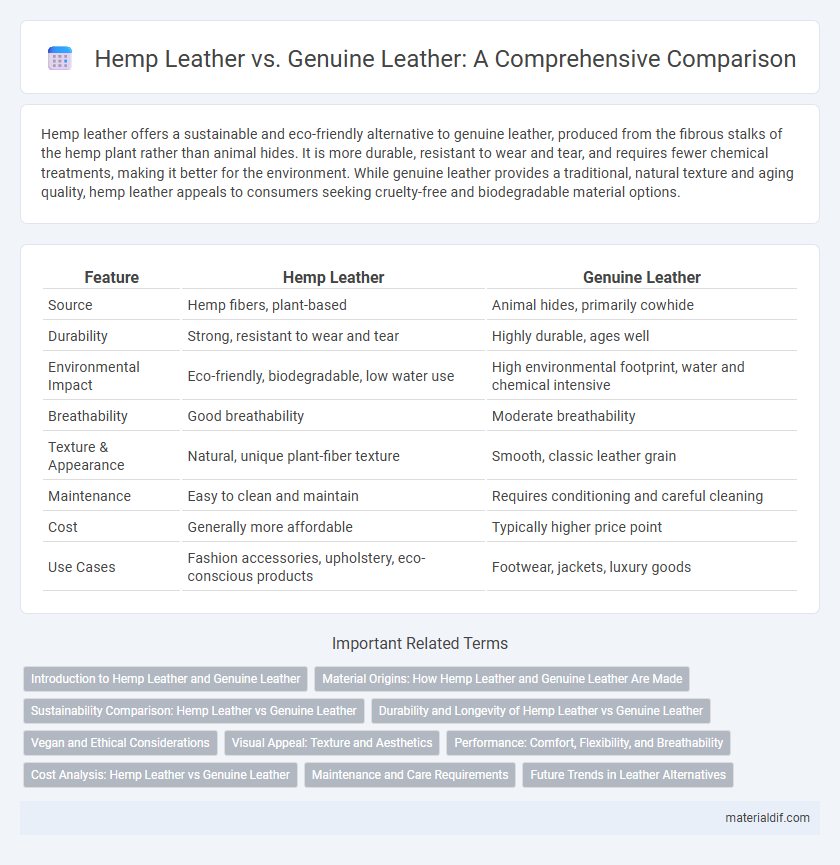Hemp leather offers a sustainable and eco-friendly alternative to genuine leather, produced from the fibrous stalks of the hemp plant rather than animal hides. It is more durable, resistant to wear and tear, and requires fewer chemical treatments, making it better for the environment. While genuine leather provides a traditional, natural texture and aging quality, hemp leather appeals to consumers seeking cruelty-free and biodegradable material options.
Table of Comparison
| Feature | Hemp Leather | Genuine Leather |
|---|---|---|
| Source | Hemp fibers, plant-based | Animal hides, primarily cowhide |
| Durability | Strong, resistant to wear and tear | Highly durable, ages well |
| Environmental Impact | Eco-friendly, biodegradable, low water use | High environmental footprint, water and chemical intensive |
| Breathability | Good breathability | Moderate breathability |
| Texture & Appearance | Natural, unique plant-fiber texture | Smooth, classic leather grain |
| Maintenance | Easy to clean and maintain | Requires conditioning and careful cleaning |
| Cost | Generally more affordable | Typically higher price point |
| Use Cases | Fashion accessories, upholstery, eco-conscious products | Footwear, jackets, luxury goods |
Introduction to Hemp Leather and Genuine Leather
Hemp leather, derived from the fibers of the hemp plant, presents an eco-friendly alternative to genuine leather, which is sourced from animal hides. Hemp leather offers durability, breathability, and resistance to wear, while genuine leather is prized for its natural texture, flexibility, and long-lasting qualities. Both materials serve diverse applications in fashion and upholstery, with hemp leather gaining popularity due to its sustainable production and reduced environmental footprint.
Material Origins: How Hemp Leather and Genuine Leather Are Made
Hemp leather is crafted from the fibers of the hemp plant, offering a sustainable and eco-friendly alternative due to its renewable agricultural source and minimal chemical processing. Genuine leather originates from the tanned hides of animals, primarily cows, involving extensive treatment with chemicals such as chromium salts to preserve and soften the material. The distinct material origins highlight hemp leather's vegetable-based composition versus the animal-derived and more resource-intensive manufacturing process of genuine leather.
Sustainability Comparison: Hemp Leather vs Genuine Leather
Hemp leather offers a significantly more sustainable alternative to genuine leather due to its lower environmental impact in cultivation and production. Hemp requires less water, pesticides, and land compared to raising cattle for genuine leather, which contributes to deforestation and greenhouse gas emissions. Furthermore, hemp leather biodegrades faster and avoids the toxic chemicals used in tanning processes typical of conventional leather.
Durability and Longevity of Hemp Leather vs Genuine Leather
Hemp leather exhibits impressive durability due to its natural fibers, offering resistance to wear and tear compared to genuine leather, which can degrade over time with exposure to moisture and sunlight. The tensile strength of hemp leather ensures prolonged longevity, maintaining its structural integrity and appearance longer under daily use. Unlike genuine leather, hemp leather also resists cracking and fading, providing a sustainable and long-lasting alternative for leather goods.
Vegan and Ethical Considerations
Hemp leather offers a sustainable and vegan alternative to genuine leather, produced without animal cruelty or environmental harm associated with livestock farming. This plant-based material boasts durability and biodegradability, reducing the carbon footprint compared to traditional leather tanning processes that often involve toxic chemicals. Choosing hemp leather supports ethical fashion by promoting cruelty-free practices and sustainable resource use.
Visual Appeal: Texture and Aesthetics
Hemp leather offers a unique matte finish with a natural, fibrous texture that enhances its earthy and rustic aesthetics, appealing to eco-conscious consumers. Genuine leather displays a smoother surface with a variety of finishes, including polished, glossy, or distressed, providing a classic and luxurious visual appeal. The distinct texture of hemp leather creates an artisanal look, while genuine leather's versatility supports both traditional and high-end fashion styles.
Performance: Comfort, Flexibility, and Breathability
Hemp leather offers superior breathability and moisture-wicking properties compared to genuine leather, making it more comfortable in warm climates. Its natural fibers ensure enhanced flexibility and lightweight performance without compromising durability. Genuine leather, while traditionally durable, tends to be less breathable and can feel stiffer, requiring longer break-in periods for optimal comfort.
Cost Analysis: Hemp Leather vs Genuine Leather
Hemp leather offers a cost-effective alternative to genuine leather due to its lower production and maintenance expenses, often priced 20-40% less than traditional leather products. Genuine leather entails higher costs associated with animal rearing, tanning processes, and durability treatments, contributing to its premium pricing. While hemp leather is more affordable and eco-friendly, genuine leather generally retains higher resale value and longevity, influencing overall cost considerations.
Maintenance and Care Requirements
Hemp leather requires minimal maintenance due to its natural resistance to water and mildew, needing only occasional cleaning with a damp cloth to prevent dirt buildup. Genuine leather demands more intensive care, including regular conditioning and protection from excessive moisture to prevent cracking and drying out. The durability of hemp leather combined with its low upkeep makes it an eco-friendly alternative for users seeking easy care materials.
Future Trends in Leather Alternatives
Hemp leather is emerging as a sustainable alternative to genuine leather due to its eco-friendly cultivation and biodegradability, addressing the environmental concerns of traditional leather production. Advances in hemp processing technology enhance the durability and texture of hemp leather, positioning it as a viable option for fashion and automotive industries. Market trends indicate increasing consumer demand for cruelty-free, plant-based leather alternatives, driving innovation and investment in hemp-based materials.
Hemp leather vs Genuine leather Infographic

 materialdif.com
materialdif.com